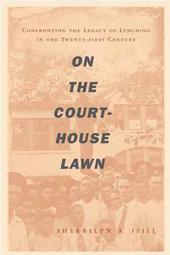
|
On the Courthouse Lawn
Paperback / softback
Main Details
| Title |
On the Courthouse Lawn
|
| Authors and Contributors |
By (author) Sherrilyn Ifill
|
| Physical Properties |
| Format:Paperback / softback | | Pages:232 | | Dimensions(mm): Height 229,Width 152 |
|
| ISBN/Barcode |
9780807023044
|
| Classifications | Dewey:364.134 |
|---|
| Audience | |
|---|
|
Publishing Details |
| Publisher |
Beacon Press
|
| Imprint |
Beacon Press
|
| Publication Date |
14 August 2018 |
| Publication Country |
United States
|
Description
This exploration of the effects of lynching in the U.S. speaks powerfully to us in these times that have witnessed the creation of the Legacy Museum and the National Memorial for Peace and Justice. Nearly five thousand black Americans were lynched between 1890 and 1960, and the effects of this racial trauma continue to resound. Inspired by South Africa's Truth and Reconciliation Commission, and drawing on techniques of restorative justice, Sherrilyn Ifill, president and director-counsel of the NAACP Legal Defense and Educational Fund, offers concrete ways for communities to heal. She also issues a clarion call for communities with histories of racial violence to be proactive in facing this legacy. This revised edition speaks powerfully to us in these times that have witnessed the creation of the Legacy Museum and the National Memorial for Peace and Justice in Montgomery, Alabama. e new foreword from Bryan Stevenson helps readers to better understand contemporary struggles and come to terms with the legacy of racial terror in the United States. In a new afterword, Ifill reflects on the recent strides made throughout the country to break the silence surrounding lynching and to recognize the victims of violence.Th
Author Biography
Noted civil rights attorney, Sherrilyn Ifill is the seventh President and Director-Counsel of the NAACP Legal Defense and Educational Fund, Inc. and former professor at the University of Maryland School of Law. Ifill is a nationally recognized advocate for civil rights, voting rights, and judicial diversity.
Reviews"As has been powerfully detailed in Sherrilyn A. Ifill's extraordinary work on lynching, there is an urgent need to challenge the absence of recognition in the public space on the subject of lynching."-Equal Justice Initiative "Sherrilyn Ifill's seminal work exposing the brutality of the abhorrent, barbaric practice of lynching is as important today as it was ten years ago when it was first published-perhaps more so. Ms. Ifill persuasively argues that this country should confront its sordid history of lynching through a truth and reconciliation process. Inspired by her work, many have begun that process. On the Courthouse Lawn should be read, and re-read, by anyone interested in racial justice and healing in this country."-Angela J. Davis, author of Arbitrary Justice "This pathbreaking book by Sherrilyn Ifill shows how the ugliest messages from our racial history and politics can hide openly in the public square. Her unflinching memory restores hope for the common good."-Taylor Branch, Pulitzer Prize-winning author of Parting the Waters "Ifill offers a new approach to addressing the history of lynching in America. . . One legacy [of racial violence] is the difficulty blacks and whites have even of discussing it, since few really want to remember what, for most on both sides of the divide, were traumatizing events. Yet remembering is essential. An intriguing, immodest proposal that itself warrants discussion-and action. -Kirkus Review, starred review "A sobering and eye-opening book on one of America's darkest secrets. A must read for anyone willing to examine our history carefully and learn from it." -Professor Charles J. Ogletree, Jr., executive director of the Charles Hamilton Houston Institute for Race and Justice "A thoroughly researched, unflinching account of the ugly history of the Eastern Shore's early-twentieth-century lynchings."-Petula Caesar, Baltimore City Paper "Elegantly written and persuasively argued . . . Ifill explores the possibilities and offers concrete advice on how truth and reconciliation could be widely employed in the United States."-Mary Frances Berry, Geraldine R. Segal Professor of American Social Thought and professor of history, University of Pennsylvania
|